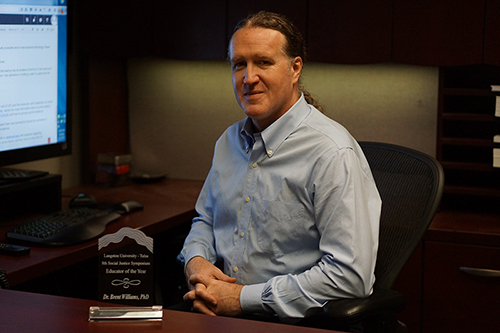Williams Recognized for Service to Social Justice

Brent Thomas Williams received the Educator of the Year award from Langston University in Tulsa.
Social justice is embedded into the curriculum of the rehabilitation education and research program at the University of Arkansas, so much so that the program coordinator was honored with an Educator of the Year award by Langston University in Tulsa at its annual Social Justice Symposium.
The award presented Nov. 11 to Brent Thomas Williams, U of A associate professor of rehabilitation education and research, is in recognition of service to social justice, explained John Sassin, coordinator of the rehabilitation services program at Langston University. The Social Justice Symposium is now in its eighth year at the historically black university.
"We wanted to give our students the opportunity to meet the movers and shakers in the field of rehabilitation and other allied health and community programs," Sassin said. "Since we started the symposium, Dr. Williams and the University of Arkansas have been closely involved and supportive, bringing speakers and students."
Williams was recognized not for one single accomplishment but for many aspects of his work, Sassin said, including his commitment to social justice, his mentoring of doctoral students, his work with the Arkansas PROMISE project, and other experiences in the rehabilitation field that he shares with students. A committee of Langston University faculty members and community activists chooses the recipient.
Williams said the award is a singular honor in that Langston University has been engaged in social justice since long before the term was coined.
"As a historically black university, Langston University's well-established legacy of championing civil rights makes the receipt of this award all the more humbling," Williams said.
The symposium is unique in the region and each year focuses on issues relevant to the times, Sassin said.
"We look at social justice-related issues in the community such as health care and educational disparities, how faith-based programs can come together to provide guidance for the community, criminal justice and a whole variety of topics from climate change to gay and lesbian issues to immigration," he said.
Organizers felt the need for the symposium was greater than ever in 2016, Sassin said.
"We did a post-election analysis and talked about how human rights are a universal issue," he said. "Reality is a lot of people are fearful and the symposium brought together a lot of divergent voices."
Sassin met Williams when Sassin was a doctoral student at the U of A. He received his degree in 2011.
"Dr. Williams represents a compassionate and active voice for people with disabilities," Sassin said. "I always bring him in to speak on disability rights."
In 2014, the overall prevalence rate of people with a documented disability in the United States was 12.6 percent, Williams said; estimates for the actual prevalence of disability in the United States approach 20 percent.
"Disability cuts across all of the other marginalizing variables in our society, such as gender, orientation, ethnicity and religion," he said. "As such, people with disabilities represent one of the largest minority groups in the U.S.
"Within our society, disability acts as one of the more potent marginalizing forces," Williams continued. "There is a dynamic and inextricable link between disability and poverty. This interplay creates a devastating cycle. People with disabilities experience much higher incidences of poverty. People with few economic resources acquire disabilities at much higher rates because of their lack of access to good nutrition and health care, as well as safe living and working conditions."
Once this occurs, he said, people in these circumstances face additional barriers to the education, employment and public services that could otherwise assist them in escaping poverty.
"Social justice is the frame within which the biases that perpetuate these inequities can be understood and addressed," Williams said. "That is why social justice is so important. No society can flourish as long as vast numbers of its citizenry are trapped in an unending cycle of marginalization."
Topics
Contacts
Heidi S. Wells, director of communications
College of Education and Health Professions
479-575-3138,
heidisw@uark.edu
Headlines
Honors College to Host Pulse Discussion Around Baltimore Bridge Accident
The Honors College will present a panel of faculty with expertise on engineering, labor history and supply chain to discuss the impact of the accident at 3:30 p.m. Wednesday, April 24, in Gearhart Hall, room 258.
Entrepreneurial Path Follows Tradition and Family Legacy
When Blanca Ruiz made a pivotal career decision to pursue a newfound passion rooted in a family legacy, she took advantage of training through the U of A Small Business Center.
'Peace' Sculpture by Native American Artist Dedicated at Adohi Hall
The 33-inch high bronze sculpture, created by Native American artist Retha Walden Gambaro in 1997, features a dove in two hands and titled simply "Peace," was donated by Richard Anderson and John Berry.
Cyber Careers with University SFS Alum Calvin Franz on April 25th
Alumnus Calvin Franz will be joining the CyberHogs RSO to talk about what it's like post-graduation as a cybersecurity developer in the public sector at 5 p.m. Thursday, April 25, at J.B. Hunt Center room 0216.
Take a Study Break in Mullins Library
As finals approach, the University Libraries have teamed up with partners across campus to offer study breaks in the east lobby of Mullins Library that are free and open to all U of A students.




